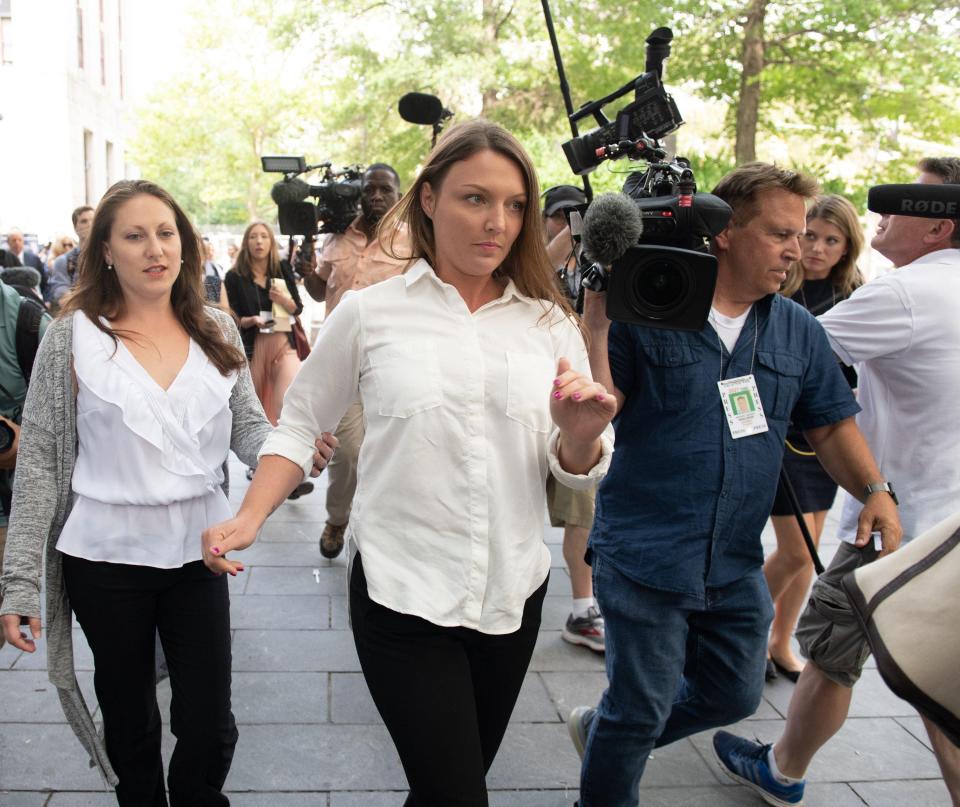The Palm Beach Post sued to find out why Jeffrey Epstein wasn't stopped 15 years ago
Long before Jeffrey Epstein was considered one of the most notorious sexual predators in history, long before the plea "deal of the century," the stepmother of a 14-year-old Royal Palm Beach girl in 2005 made a call to police in Palm Beach.
She said her stepdaughter may have been molested by a wealthy man.
That started a case that was to last at least another 16 years and involve at least 135 victims from Palm Beach County, New York, New Mexico and overseas. And still, it's not over.
After the stepmother's call, police investigated and found at least a dozen underage girls who told the same stories of giving Epstein "massages" at his Palm Beach mansion that involved molestation or rape with a couple of hundred dollars in pay after it was over.
The Post's investigation: Palm Beach Post investigation: Jeffrey Epstein Case - The First Failure
More: Judge expects to release sex offender Jeffrey Epstein's 2006 grand jury transcript
The original lawsuit: Why was Jeffrey Epstein charged only as a ‘john’? Post sues to find out
Where to get help: Where to get help, hope in Palm Beach County if you're a victim of sexual assault
They were from Royal Palm Beach High and other schools in the county when they were recruited, often by their friends who'd also been sexually abused. Five were under age 16. Legally, the girls could not consent to sex until they were 18.
The first prosecutor had a dozen victims, called only one witness

The case could have ended in 2006. That's when the first prosecutor, Palm Beach County's State Attorney Barry Krischer, in a highly unusual move, convened a grand jury rather than charge Epstein directly.
His office called only one witness, the 14-year-old, and apparently worked to sink its own case with her social media pages, in which she appeared to be drinking liquor with boys and talking about sex. The grand jury is a secret venue that prosecutors control without rebuttal from the defense.
What emerged from that proceeding was a single charge of solicitation of prostitution against Epstein.
No indication that the victim was underage. No indication of molestation. No indication that she couldn't legally consent to being a prostitute.
Krischer had never spoken with any of Epstein's accusers. His lead prosecutor said more than once that there were "no victims" in the case.
The Palm Beach Post sued in 2019 to reveal to the public why that proceeding turned out the way it did, why Epstein was not stopped when police already had found multiple victims.
How did a charge against Jeffrey Epstein that a 'John' would face come about?
How exactly grand jurors managed to come up with only that one charge is unknown because the inner workings of grand juries are strictly secret. The Post's suit latched onto a rarely used state law that allows a judge to unseal the grand jury records for "the furtherance of justice."
"Public disclosure of the Epstein grand jury proceedings will shed light on the extent to which those in our government entrusted with the solemn responsibility of enforcing our criminal laws equally as to all citizens fulfilled their duties in this instance," the suit reads.
Disgusted with how the state attorney was handling the case, Palm Beach Police Chief Michael Reiter sent his investigation to the FBI. Federal prosecutors would go on to work out a "deal of the century" that, after finding nearly 40 victims, allowed Epstein in 2008 to plead guilty to two felonies — solicitation of prostitution and sex with a minor. He also had to register as a sex offender.
He spent 13 months in private cell, apart from the general inmate population in the Palm Beach County Jail, during which he was allowed to go to his office six days a week for 12 hours a day.
Over the next 15 years, justice would elude his victims, treated as prostitutes by the first prosecutors and kept in the dark by federal prosecutors as they negotiated the "deal." Federal law said the victims should have been consulted and they tried to get prosecutors held responsible. But Epstein's death would shut them out of that remedy.
After serving time, Epstein would continue to be a darling of the rich and famous, despite his status as a sexual offender. All the while, there were more battles in the courts. Epstein and his attorneys were cutthroat, even when it came to victim compensation claims in Palm Beach County mandated by his plea deal.
One victim had to face having evidence of her abortions presented during testimony.
Then finally in 2019, New York prosecutors charged Epstein with sex trafficking. Soon after the former U.S. attorney resigned as secretary of labor over his handling of the original case.
The elusive accounting for Epstein wouldn't end there. In August 2019, he was found hanged in a New York City Jail. A medical examiner ruled his death a suicide.
Still the saga continues and the victims still seek justice. Ghislaine Maxwell, Epstein's ex-girlfriend, goes on trial Nov. 29 on charges of helping him in his international sex trafficking ring.
Read The Post's investigation
The Jeffrey Epstein case started in Palm Beach County 15 years ago with victims from local schools and it could have ended here. The Post Beach Post set out to find out why it didn’t. The newspaper found that the state attorney sunk his own case. Find out how in our 2019 investigation.
hbaltz@pbpost.com
This article originally appeared on Palm Beach Post: Jeffrey Epstein: Palm Beach Post sued to find out why he wasn't stopped

